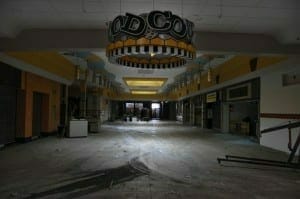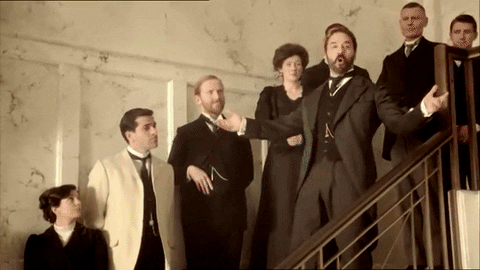For the better part of last century, the key to financial glory was to own retail. Big stores with luxuries from across the pond, exotic dream fuel at bargain prices, the J Peterman feel of being able to bring in the best of the world and put it in your living room.
That eventually morphed into the mall, where we could all go and spend a day supping from the Orange Julius, looking for doorbuster bargains while we loaded up on child-sewn generi-pants at the Gap.
That was eventually followed by the big box store – lowering margins but making bank on the back of quantity rather than quality, with the Wal-Marts and Best Buys and Targets shoving small businesses into the loss leader game before eventually replacing them with Chinese-made substitutes when the bottom line wouldn’t give anymore.
That forced high priced brands to step down a notch and open ‘outlet’ stores, which ate into everyone’s margins and got consumers used to the existence of a better deal.
That duly brought the Dollar Stores, which started out as liquidation houses but quickly became a place where big brands would park smaller sizes and lower quality products built for the lower classes and no apologies about it.
Well, that shit’s done. There’s nowhere left for retail to go. Amazon does more business now than the rest of big box retail put together, and the small business owner, which bricks and mortar stores did their best to kill off, is utilizing Amazon to make their own spirited comeback. Even better, if you’re down with the schadenfreude kick, those small business owners have figured out that you can make it in bricks and mortar retail if you go the artisan route.
But for big business, retail is over.
Take as an example the brutal quarterly losses at Hudson’s Bay Company announced last week. $93m lost, despite buying up Saks Fifth Avenue, despite expanding through Europe, despite making changes to their supply chain to find savings and improvements, and even venturing into the online discount space.
HBC execs tried to turn it into an ‘everything is going how we planned’ deal, but the fact remains that retail is dying a horrible death and there’s no two ways around it.
Look at the Canadian landscape as a microcosm – Target dropped billions buying Zellers as part of its ill-fated foray up north, closing those and opening their own giant cathedrals to deals, before eventually retreating entirely with its tail between its legs, executives dropping like flies, and profits not even close.
Future Shop was recently shuttered, with its parent company realizing that running the same company under a different banner (Best Buy), often in the same mall, wasn’t bringing any real advantage at all. And with nobody lining up to take over Future Shop, it was more profitable (read: less onerous) to simply break giant leases across the country rather than sell it.
The Gap can’t find its backside with both hands, American Apparel is in tatters, the local mall where I live has about 25% of its space empty despite being well attended. In Vancouver’s downtown, empty storefronts are at epidemic levels, with only the rapid growth of unlicensed marijuana dispensaries keeping the city from resembling a ghost town.
“We’ll bring the playbook from Canada to Europe, beginning with the renovation of the Dusseldorf store,” said [HBC CEO Jerry] Storch. “We expect to see the kind of results we’ve seen in Canada…with our remodels, as we really have a system for this.” [Chairman] Baker said the company is well-placed to weather retail storms because of it’s geographical diversity and diversity of operations, including a strong foundation in real estate.
*Cough*bullshit*cough*
I went looking for shirts at HBC last week. It was a mind-numbing experience. I had to climb six floors to get to the menswear section, past the Topman menswear section which stocks nothing that will fit anyone who isn’t ‘slimfit’, then I had to find what I wanted, in the size and style I wanted, at prices that varied between good and preposterous. I had to find somewhere to pay, then get someone to actually attend to me, then get past the credit card pitch, then carry my shit around all day until I got home.
Admittedly, this used to be just fine because there was no other option. Just as our grandparents had to make do with an outhouse behind the oak tree, they also had to schlep their goods from store to store because there was no other way to shop.
Now there is.
Sunday night, at around 11pm, I went shopping again. Only this time I did so online, finding everything I needed, in the style and colour and size I needed, finding the best price available, with free shipping the next day and no questions asked return policies. The money I was going to spend at HBC, I instead spent at four different places and I may or may not have been wearing pants as I did so.
Ask me if I’m ever going to walk into an HBC again, regardless of their sales, their new brands, and their plans to remodel.
Retail is done. Just as Blockbuster died when, after years of exploiting customers at every turn and offering the worst customer experience possible, the first sign of an alternative gave the entire client base a way out, years of terrible customer experiences in malls and stores manned by minimum wage drones with layouts designed to force us to walk past things we don’t want, with Halloween Christmas sales and sizing aimed at the largest demographic with the smallest waist, with no concern for the others, have finally taken roost. Take your Sbarro and shove it.
“We lost the promotional spikes we’d been getting on some of the big holiday weekends, for example, but in return, we got a substantial increase in our gross margin rate, of the type that you kind of hope for as a merchant in your career and rarely see and that’s translated into an improvement in overall profitability,” said Storch.
And a $93m quarterly loss.
Retail is done.
And even HBC knows it. They recently bought online discount retailer gilt.com, which is essentially a dollar store for lah-de-dah brands, and also decidedly non-retail and embracing of the online shift. But the share price doesn’t rise with acknowledgement that a hundred-plus years of retail frontage are about to go dormant, so they’ll keep remodeling and acquiring and telling investors that the change is just around the corner and more stores means success.
It doesn’t. Our grandchildren will never walk into a department store. Like newspapers and polaroids and bad scotch and trans-fats, we’ve all moved on from the archaic thinking that we need to come to you to give you our money.

Retail stores are dead. Adjust your portfolios accordingly.
— Chris Parry
http://www.twitter.com/chrisparry

